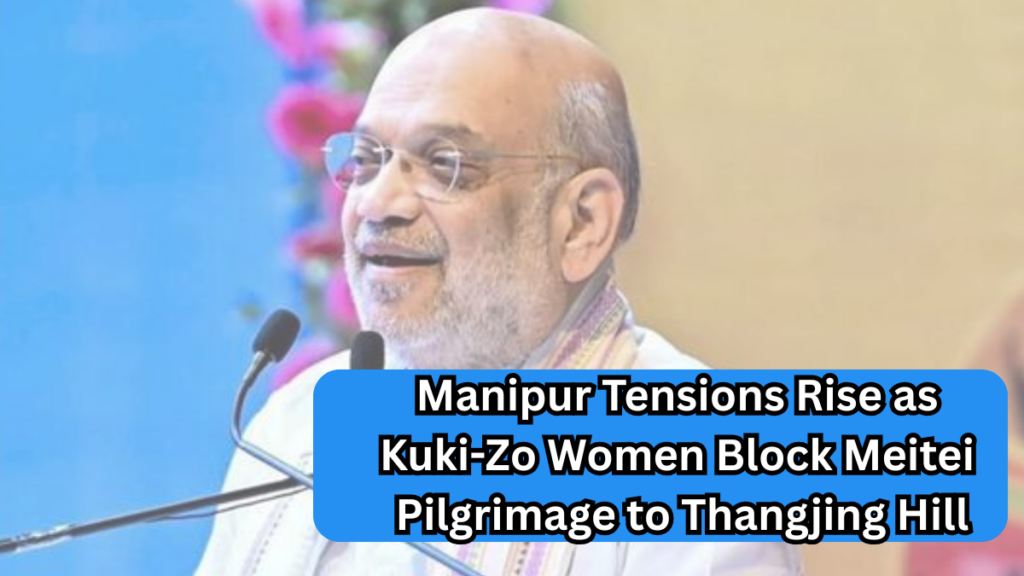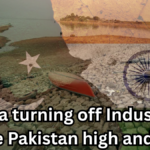Emotions are running high in the violence-scarred state of Manipur as thousands of Kuki-Zo women staged peaceful sit-ins across Churachandpur on Sunday. Their demand: deny “unauthorised entry” into territories they identify as their own.
This protest came just a day ahead of the Meitei community’s planned pilgrimage to Thangjing Hill, a sacred site with deep spiritual and ancestral significance. Despite the Union Home Ministry’s directive to ensure freedom of movement across the state, the growing divide between the Meitei and Kuki-Zo groups has sparked another flashpoint in an already fragile peace.

A Sacred Site Under Tension
The Meitei Heritage Welfare Foundation (MHWF) has urgently appealed to Union Home Minister Amit Shah to intervene after Meitei pilgrims were allegedly threatened and intimidated while attempting to access Thangjing Hill, located in Kuki-Zo dominated Churachandpur.
Why Thangjing Hill Matters to the Meiteis:
-
Home to Ibudhou Thangjing, the guardian deity of the Meitei people.
-
A revered pilgrimage destination, especially during Cheiraoba, the Meitei New Year.
-
Symbol of cultural, spiritual, and ancestral connection.
MHWF likened the current blockade to barring:
-
Hindus from visiting Kailash Parbat, or
-
Muslims from travelling to Mecca.
“This is not just about access — it’s about upholding our constitutional rights,” the MHWF emphasized.
Rising Voices and Sit-in Protests by Kuki-Zo Women
In a powerful show of resistance, Kuki-Zo women, draped in traditional attire, gathered at various checkpoints across Churachandpur. Their message was clear: no entry to Meiteis into our land unless a constitutional settlement is reached.
Core Demands from the Kuki-Zo Community:
-
Preserve the sanctity of buffer zones.
-
Prevent unauthorized access to their territories.
-
Ensure dialogue before decisions on pilgrimage routes.
-
Protect historical and political rights.
Their sit-ins are not merely political—they’re personal. With memories of past violence still fresh, many fear that any incursion across buffer zones could trigger a violent chain reaction.
Voices from Both Sides: A Comparison
Here’s a quick overview of the contrasting concerns:
| Meitei Community (via MHWF) | Kuki-Zo Community |
|---|---|
| Sacred pilgrimage to Thangjing | Unauthorised entry seen as provocation |
| Facing threats and armed intimidation | Fear of buffer zone violations |
| Constitutionally guaranteed freedom of religion and movement | Urging dialogue before allowing access |
| Accuses militants of blocking peaceful worship | Demands safety and autonomy in their areas |
MHWF Calls for Government Action
The Meitei group has submitted a memorandum to the Union Home Ministry and Governor Ajay Kumar Bhalla, pressing for:
-
Strict enforcement of constitutional rights.
-
Deployment of additional security forces to safeguard pilgrims.
-
Legal action against militant groups threatening peace.
-
Implementation of the March 1 directive, which calls for free movement across Manipur from March 8.
“Will the Government of India uphold the Constitution, or surrender to the intimidation of armed groups?” the MHWF asks.
Ethnic Divide and the Broader Crisis
Since ethnic clashes broke out in May 2023, the consequences have been devastating:
-
260+ lives lost
-
60,000+ displaced
-
Ethnic segregation with buffer zones between Meitei-dominated plains and Kuki-Zo hill areas
In February 2025, President’s Rule was imposed in Manipur after Chief Minister N. Biren Singh stepped down amid allegations related to the violence.
FAQs
1. Why is Thangjing Hill important to the Meitei community?
Thangjing Hill is considered the abode of Ibudhou Thangjing, the guardian deity of the Meiteis. Pilgrimages, especially during New Year (Cheiraoba), are integral to their cultural identity.
2. Why are Kuki-Zo women protesting now?
They fear the pilgrimage could be a pretext to breach buffer zones and assert territorial claims. Their sit-ins are a call to protect community autonomy and safety.
3. Is there government intervention planned?
Yes, the Union Home Ministry has already issued orders for free movement across the state and may deploy additional security forces to maintain order.
4. What caused the initial ethnic violence in Manipur?
The violence began over reservation demands and long-standing ethnic grievances between the Meitei and Kuki communities, rapidly escalating into deadly clashes.
This crisis highlights the urgent need for dialogue, constitutional enforcement, and mutual respect to prevent further bloodshed. While sacred hills and traditions anchor communities, it is peace and empathy that will truly elevate the spirit of Manipur.
Click here to learn more
Pari is a passionate writer known for captivating stories that blend imagination and reality. Inspired by travel, history, and everyday moments, Pari crafts narratives that resonate deeply with readers.




